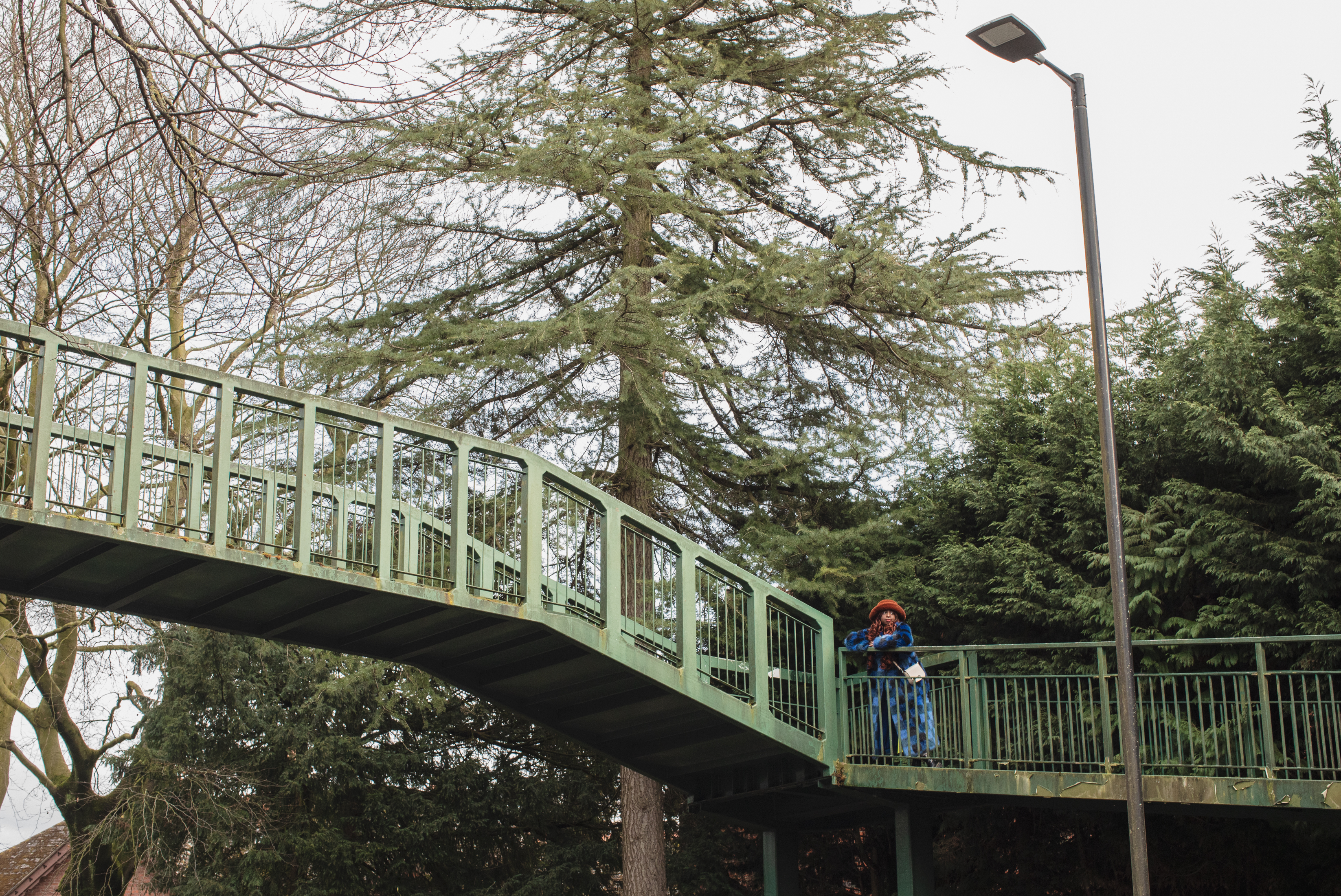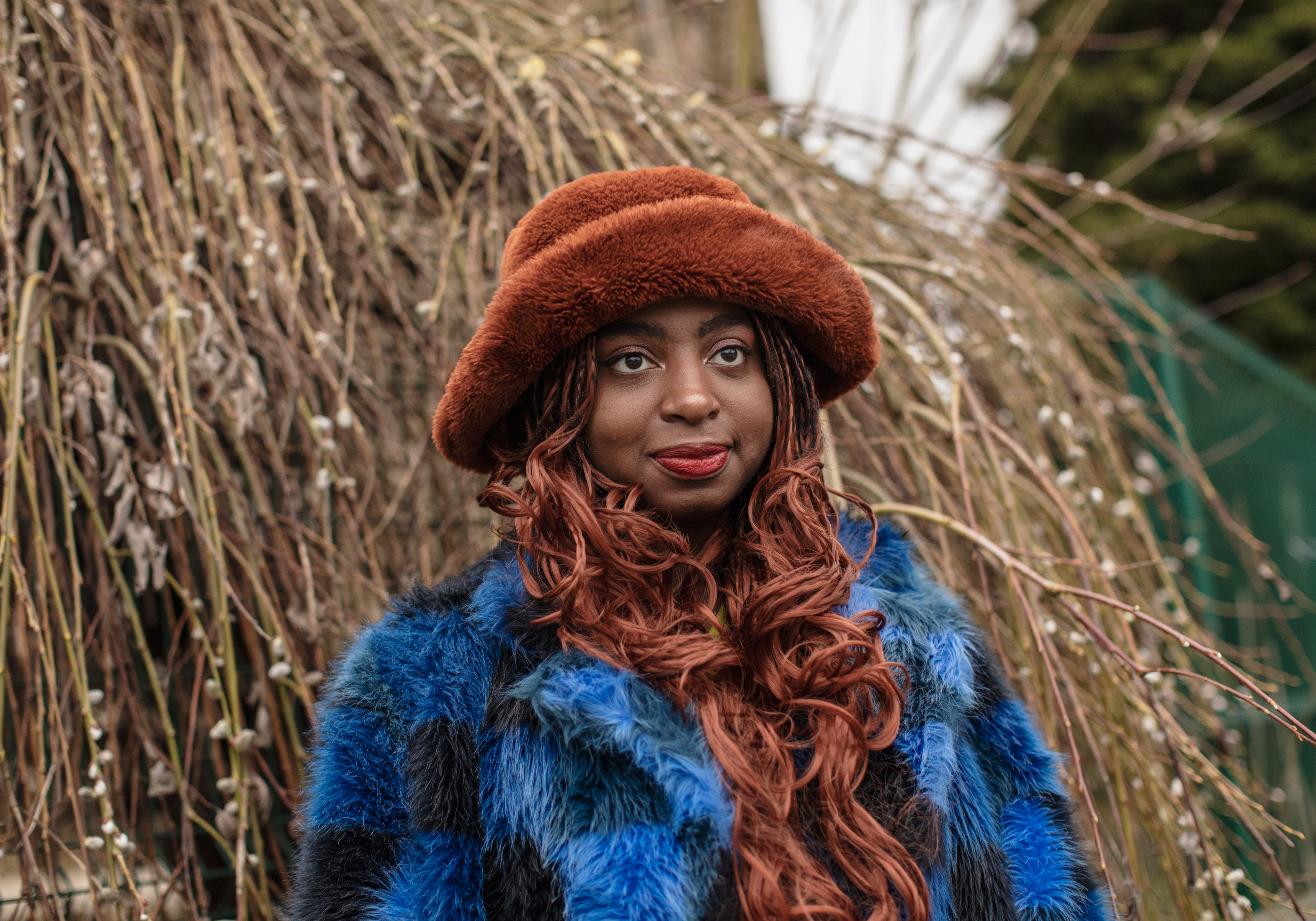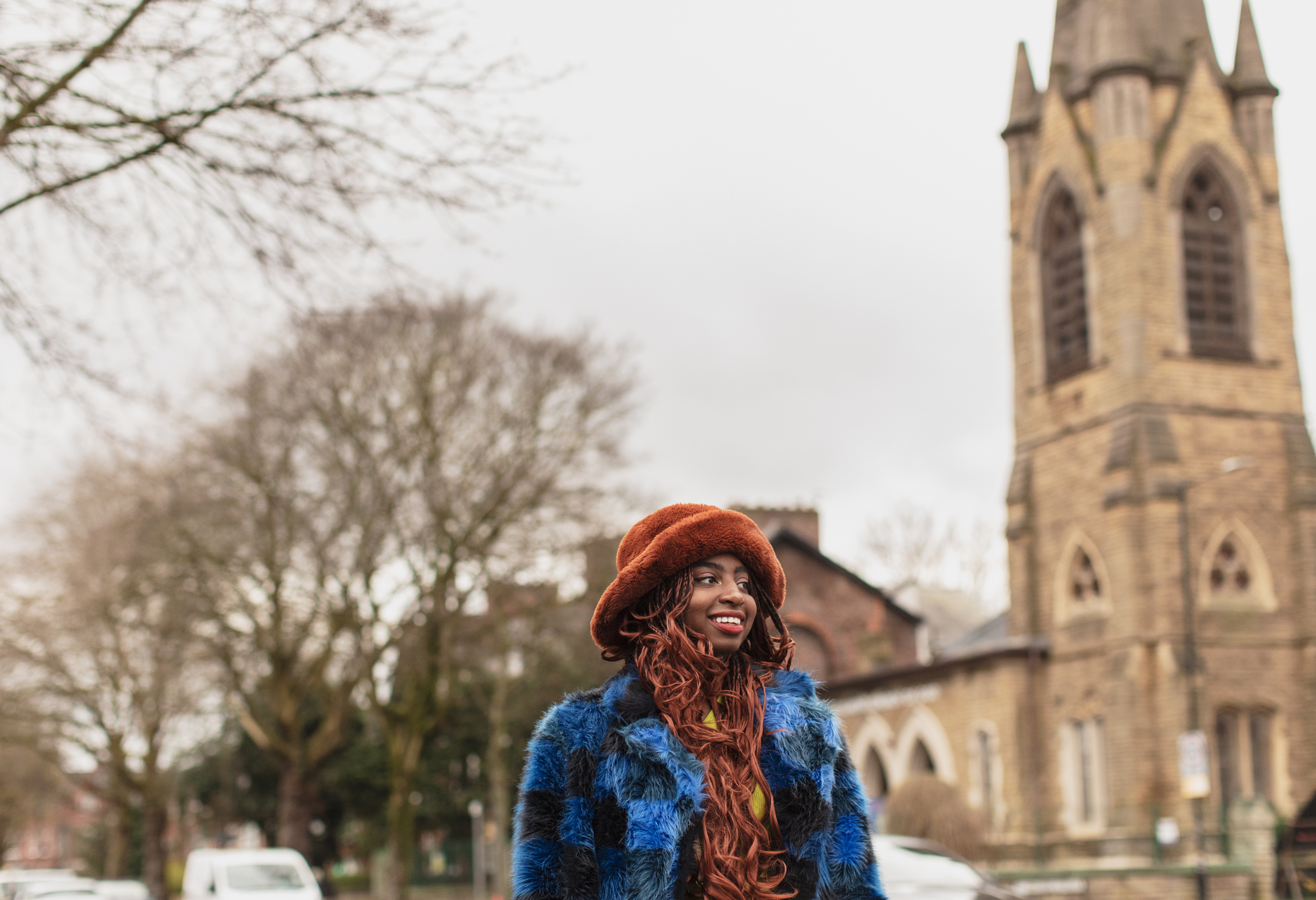Have you ever had one of those moments where a scent takes you back to a time and place with such intensity that you feel catapulted through time and space, like in That’s So Raven? If I get a slight whiff of So…? Kiss Me or Alien by Mugler, I sprint down memory lane to when I had an 0161 dialling code. Suddenly I’m 14 in the Manchester suburbs, asking locals to buy me a bottle of Malibu to drink next to bins local boys have set on fire for warmth. I’m sheltering from the pouring rain on Market Street (I once saw two human shits on the shop floor of the TK Maxx) or loitering in the “people’s palace”: Trafford Centre, the most architecturally-striking shopping centre in the UK and a £600 million Las Vegas-like homage to the Sistine Chapel.
One spritz of the scents I used to douse myself in and I’m 15, headed to the under-18s superclub in Warrington, having picked out a look from my designated nu-rave drawer of technicolour tutus, legwarmers and other miscellaneous neon accessories, hoping I’ll get de-fridged on the dancefloor (a fridge: someone who hasn’t yet been kissed). Nay! I could be 16, feeling grown up on Deansgate Locks, teetering in Jeffrey Campbell knockoff wedges. Fuck, I could even have smelled like that at 17, trying to freshen up at electronic music mecca Sankeys as sweat drips from the ceiling and I pretend I’m having the same time as everyone else by dropping a Pro Plus in the midst of the MCAT craze.
Videos by VICE
Most of my evocative personal memories of my hometown are over a decade away. For this reason, thinking of something contemporary to put in a personal essay about my homecoming is quite difficult. I’m straddling the Manc urge to assert that where I am from is better than London, and the admission that I have mostly abandoned my northwestern nucleus since I left at 18 to pursue my dream of becoming a writer.

A lot of my early memories are situated in Whalley Range, where I went to school a stone’s throw away from Moss Side. I pick up a chicken split (fried chicken sandwiched inbetween two dumplings) from Chicken Run, as my parents would when they picked me up from hanging around at school friends’ houses. The foundation for my separation from Manchester can be mapped back to early childhood, when others were dreaming of being a pop star or an astronaut. I would write stories and recite them to friends on the playground at lunchtime. Cheese string, hopscotch, new chapter of my Jacqueline Wilson-style odyssey. Eventually, I came to believe the story was elsewhere.

For a while, my visits revolved around hugging my Jamaican grandparents, who arrived in the city in the early 60s after outgrowing their Birmingham houseshare by getting pregnant. Then came lockdown, when I’d returned home for the first Mother’s Day in years, only for Boris put everyone on house arrest. My mother became my every day for about four months, my environment suddenly soundtracked by constant prayer, televangelism, Forex trading Zoom calls and warnings about 5G or the end of days. Still, we reconnected as adults who have gained some distance from the battles that raged during my teens.
The walk from the train station and around Sale Moor – supposedly the rougher part of Sale – is quiet, leafy and quaint. My parents love the area – mostly Mum, because of her hopes for social mobility. For her, the idea of living in a place that still clings onto being a part of Cheshire, surrounded by free grammar schools and one of the only areas on the city’s poverty heat map that isn’t completely on fire, was an enchanting prospect. We were, without a doubt, the racial minority on that side of town. Growing up, I toyed with the played-out too-Black-for-white-town, too-white-for-Black-town narrative, until I settled on the idea that being weird and a bit hard to place was an asset and that there’d be a time and a place where I’d find other misfits who make sense together because we don’t really blend in.

I walk the steps across the bridge towards Loreto Grammar School for the first time since 2012, when I ran towards adulthood, my signed mustard school shirt covered by a striped deckchair blazer and tucked into a pleated mini. Unlike my mostly Black and Asian primary school in Whalley Range, my girls’ Catholic grammar school in Altrincham was so overwhelmingly white that it was immediately apparent I was the first Black person my well-meaning peers had met. They’d ask me questions like “why are your palms white?” I’d tell them it was because my grandma was Irish and they’d actually believe me. I’ll unpack how joking became a coping mechanism one day in therapy, I’m sure.

Teens try to assimilate, so I permed my hair and tried to emulate the swooping side fringe look du jour. My “U” vowels lifted, my “T”s and “D”s hardened. My mostly working-class wider family jokingly referred to me as Mrs Bucket (pronounced “bouquet”, Keeping Up Appearances-style) due to my increased proximity to the middle classes, which felt unfair because, as I said before, it seemed completely intentional to make me a bit posh.
This is not an X Factor-style personal trauma story I’m mining for content. Ultimately, I’ve been dealt a good hand. I know with some certainty that my parents would die for me, and have encouraged and supported me. I have always been surrounded by amazing friends. Plus, due to my Dad’s way of telling me to get over negative emotions as quickly as possible, I do mostly restore back to factory settings after hiccups because, like Kim Cattrall, “I don’t want to be in a situation for even an hour where I’m not enjoying myself”.

But getting funnelled through whiter and whiter spaces has meant that I’m always yearning to find my people. Black spaces were my family, or spaces that belonged to other people in my family. I didn’t have a carved-out space of my own. My pursuit to amplify people of colour, marginalised voices and people who feel culturally atypical in my work is as much about spotlighting communities as it is about burrowing myself into them. I feel we are spiritually aligned. I found that so much easier starting again, with intention, in the capital.

At 18, I boxed up all my earthly possessions and drove down Snake Pass to go to university in Sheffield and then became just one more drop in the brain drain down to London. I was going to work for magazines in the Big Smoke. I’d be less awkward. I’d fall in love with myself and then a boy; I’d find people who understand all the nuances of my being and create bonds with subterranean layers and memories, where I’d laugh until I cried or danced until my legs ached.
And thank god, all of that did happen. Given the lack of nationally or internationally recognised youth culture magazines in Manchester, I really did have to leave to have an easier shot at offices that would allow me to be heard by as many people as possible, alongside this fantasy of adulthood.

Incrementally, though, I see my hometown through a lens of all the stories locals sit on. They, too, believe there are bigger stories elsewhere; that nobody outside of the city is willing to listen. A few years ago, during Black History Month, I tried to dig out the history of racial activism in the grand Central Library, looking through materials with a literal magnifying glass. I found out about Mama Edwards, a fierce pan-African organiser fighting to improve women’s rights, housing, mental health and more alongside Olive Morris.
Edwards was actually my cousin’s grandma. Nobody in my family had ever mentioned her story – they were going to visit her that day, so I interviewed her on her death bed to document her remarkable journey. “It is so important that you remember that you’re part of a line of people who elevated this country,” she told me. Every once in a while, someone will come out with another golden anecdote that brings the city to life in a new way. One day my mum told me Mick Hucknall used to sit on her doorstep and ask her to do his washing. When she refused, he’d give her tall tales about how he would one day be famous. She doubted it, she’d told him, because he had a weird voice.

I keep being drawn back to tell those stories. My grandmother has tasked me with publishing her memoirs, which reveal shifting circumstances over time for the Windrush generation. I revisited spaces where Black people found joy in Mother Country, a book that traces the stories of the descendants of people like my grandma. It led me to realise my grandma’s Caribbean church, where I spent every other Sunday, was founded because they weren’t welcome in other congregations. The building itself is a symbol of a community resisting hostility to stake its claim on the city.

So, too is the story of the Reno, a Hulme club that was recently excavated from what I once believed was just a boring patch of grass near the Asda that used to smell of yeast fumes from the nearby brewery. Bob Marley, Muhammed Ali, and Chaka Khan once danced there in a mixed crowd in a time of “No Dogs, No Blacks, No Irish”. When my aunty told me about 8411, a Black youth club, I discovered a place where kids danced to house and techno two years before people think electronic music arrived in Britain.

I sit down at the side of the Moss Side football pitch, as I did every Friday as a kid. I was once completely inebriated at a festival when a man shouted my dad’s name at me. The football club that my father and his friends organised here had saved his life, he said. Black migrants had initially settled in the neighbourhood and made a close-knit community there. Then it was overpoliced, demolished, rebuilt as a large council estate, demonised and subsequently became the centre of gang violence as drugs washed over the city during the stratospheric rise of rave culture in the North West. But playing football with elders in the community kept him and his friends busy and served as a soft-touch mentoring scheme, one of many clubs that provided respite in the area for Black boys after the turbulence of the 80s.
I recently commissioned and wrote stories about 8411, my family, and the importance of remembering Black spaces up North as the editor-in-residence of the city’s new blockbuster venue Aviva Studios. The latter is the biggest investment in an arts and culture venue this country has seen since the unveiling of the Tate in 2000; it asserts that the city is not short on stories, but on platforms that take the time to listen to and invest in its natural raconteurs. Manchester is a main character; it’s one that regularly undergoes huge metamorphoses. Each time I go back the streets are different, a newly-erected crane punctuating the skyline, exclaiming that the city is in a constant state of reinvention.

It’s easier to live away from home as a young adult if you’re from a small town because everybody understands your reasoning. Who could blame you? The miniscule size is claustrophobic. But I’m from Manchester, the city that birthed Oasis, The Smiths, The Bee Gees (and The Ting Tings…) – a place that doesn’t take itself too seriously but has so much to offer if you’re willing to dig deep. I’ll cling to this accent for dear life.
I’m in a constant battle as to whether I can make my way back to my old love to avoid having long-vowelled children who run around and play in the “grarse”. Wherever I set up residence, I’ve made a recent promise to myself to keep finding and telling tales of the city’s communities and subcultures, its fierce activism, and its cultural exports. My obsession with storytelling can carry me back home. Because you can take the girl out of Manchester but you can’t take Manchester out of the girl, amiright?
More
From VICE
-

Collage by VICE -

(Photo via Shawano County Sheriff’s Office) -

Harry Herd/Redferns/Getty Images -

Screenshots: Sony Interactive Entertainment, Square Enix
